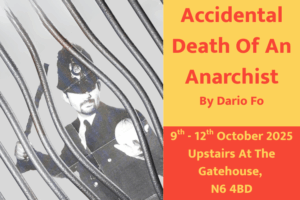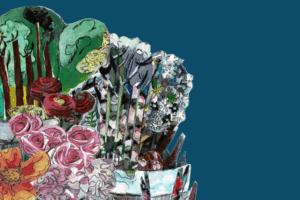
Francis Beckett’s new play Make England Great Again is set just after the Britons First Party wins its first ever general election victory, and its charismatic leader Max Moore enters 10 Downing Street.
It’s a comedy, but also a warning.
Francis Beckett’s last three plays have had successful runs at Upstairs at the Gatehouse. The New Statesman called A Modest Little Man “a moving and entertaining play about Clement Attlee.”
In The House Magazine, John McDonnell MP wrote of Vodka with Stalin: “As always with Francis’s work, you can’t fail to become emotionally close to the characters.”
His Tom Lehrer is Teaching Math and Doesn’t Want to Talk to You was “A glorious celebration of one of the brightest, wittiest and most principled satirists”.

Accidental Death of an Anarchist
by Dario Fo
Adapted by Tim Supple & Alan Cumming
This amateur production of Accidental Death of an Anarchist is presented by arrangement with Concord Theatricals Ltd. on behalf of Samuel French Ltd.
A master of disguise walks into a police station… and chaos ensues.
When a cunning con artist finds himself in police custody, he discovers something far more valuable than any heist—the perfect opportunity to turn the tables on authority itself. Armed with lightning-quick wit and a dangerous talent for impersonation, he transforms an ordinary day at the station into an extraordinary game of cat and mouse.
What begins as simple trickery evolves into something much more explosive, where every joke hides a barb, every laugh reveals a crack in the system, and nothing is quite what it seems. In this whirlwind of mistaken identities and verbal acrobatics, the question isn’t just who’s fooling whom—it’s whether anyone has the stomach for the truth when it arises.
A razor-sharp political farce that proves the most dangerous weapon isn’t a gun—it’s laughter.

Francis Beckett’s new play Make England Great Again is set just after the Britons First Party wins its first ever general election victory, and its charismatic leader Max Moore enters 10 Downing Street.
It’s a comedy, but also a warning.
Francis Beckett’s last three plays have had successful runs at Upstairs at the Gatehouse. The New Statesman called A Modest Little Man “a moving and entertaining play about Clement Attlee.”
In The House Magazine, John McDonnell MP wrote of Vodka with Stalin: “As always with Francis’s work, you can’t fail to become emotionally close to the characters.”
His Tom Lehrer is Teaching Math and Doesn’t Want to Talk to You was “A glorious celebration of one of the brightest, wittiest and most principled satirists”.

Francis Beckett’s new play Make England Great Again is set just after the Britons First Party wins its first ever general election victory, and its charismatic leader Max Moore enters 10 Downing Street.
It’s a comedy, but also a warning.
Francis Beckett’s last three plays have had successful runs at Upstairs at the Gatehouse. The New Statesman called A Modest Little Man “a moving and entertaining play about Clement Attlee.”
In The House Magazine, John McDonnell MP wrote of Vodka with Stalin: “As always with Francis’s work, you can’t fail to become emotionally close to the characters.”
His Tom Lehrer is Teaching Math and Doesn’t Want to Talk to You was “A glorious celebration of one of the brightest, wittiest and most principled satirists”.

Francis Beckett’s new play Make England Great Again is set just after the Britons First Party wins its first ever general election victory, and its charismatic leader Max Moore enters 10 Downing Street.
It’s a comedy, but also a warning.
Francis Beckett’s last three plays have had successful runs at Upstairs at the Gatehouse. The New Statesman called A Modest Little Man “a moving and entertaining play about Clement Attlee.”
In The House Magazine, John McDonnell MP wrote of Vodka with Stalin: “As always with Francis’s work, you can’t fail to become emotionally close to the characters.”
His Tom Lehrer is Teaching Math and Doesn’t Want to Talk to You was “A glorious celebration of one of the brightest, wittiest and most principled satirists”.

Francis Beckett’s new play Make England Great Again is set just after the Britons First Party wins its first ever general election victory, and its charismatic leader Max Moore enters 10 Downing Street.
It’s a comedy, but also a warning.
Francis Beckett’s last three plays have had successful runs at Upstairs at the Gatehouse. The New Statesman called A Modest Little Man “a moving and entertaining play about Clement Attlee.”
In The House Magazine, John McDonnell MP wrote of Vodka with Stalin: “As always with Francis’s work, you can’t fail to become emotionally close to the characters.”
His Tom Lehrer is Teaching Math and Doesn’t Want to Talk to You was “A glorious celebration of one of the brightest, wittiest and most principled satirists”.

Don’t miss this brand new musical adaptation of the famous children’s story by Oscar Wilde.
Experience Oscar Wilde’s enchanting tale, with catchy tunes and music.
Follow the journey of a reclusive giant whose heart transforms as he discovers the joy of sharing. Set against the backdrop of a lovely garden and filled with the innocence of children, this production brings Wilde’s timeless story to life.
Running time: 60 mins (no interval) Saturday at 2 pm and Sunday at 12 pm.
Age: 4+
Story by Oscar Wilde
Composed by John Whittaker
Libretto by Alf Williams
Adapted play text by John Whittaker
Adapted text for stage by Paula Chitty
Directed and Designed by Paula Chitty
Stage Managed by Kate Reynolds
Produced by Irrational Theatre
Choreography by Jill Priest
Cast
Giant – Daniel Meehan
Ogre – Katy Bingham-Best
Sam – Noah Golding
Charlotte – Insia Durrani

Francis Beckett’s new play Make England Great Again is set just after the Britons First Party wins its first ever general election victory, and its charismatic leader Max Moore enters 10 Downing Street.
It’s a comedy, but also a warning.
Francis Beckett’s last three plays have had successful runs at Upstairs at the Gatehouse. The New Statesman called A Modest Little Man “a moving and entertaining play about Clement Attlee.”
In The House Magazine, John McDonnell MP wrote of Vodka with Stalin: “As always with Francis’s work, you can’t fail to become emotionally close to the characters.”
His Tom Lehrer is Teaching Math and Doesn’t Want to Talk to You was “A glorious celebration of one of the brightest, wittiest and most principled satirists”.

Don’t miss this brand new musical adaptation of the famous children’s story by Oscar Wilde.
Experience Oscar Wilde’s enchanting tale, with catchy tunes and music.
Follow the journey of a reclusive giant whose heart transforms as he discovers the joy of sharing. Set against the backdrop of a lovely garden and filled with the innocence of children, this production brings Wilde’s timeless story to life.
Running time: 60 mins (no interval) Saturday at 2 pm and Sunday at 12 pm.
Age: 4+
Story by Oscar Wilde
Composed by John Whittaker
Libretto by Alf Williams
Adapted play text by John Whittaker
Adapted text for stage by Paula Chitty
Directed and Designed by Paula Chitty
Stage Managed by Kate Reynolds
Produced by Irrational Theatre
Choreography by Jill Priest
Cast
Giant – Daniel Meehan
Ogre – Katy Bingham-Best
Sam – Noah Golding
Charlotte – Insia Durrani

Francis Beckett’s new play Make England Great Again is set just after the Britons First Party wins its first ever general election victory, and its charismatic leader Max Moore enters 10 Downing Street.
It’s a comedy, but also a warning.
Francis Beckett’s last three plays have had successful runs at Upstairs at the Gatehouse. The New Statesman called A Modest Little Man “a moving and entertaining play about Clement Attlee.”
In The House Magazine, John McDonnell MP wrote of Vodka with Stalin: “As always with Francis’s work, you can’t fail to become emotionally close to the characters.”
His Tom Lehrer is Teaching Math and Doesn’t Want to Talk to You was “A glorious celebration of one of the brightest, wittiest and most principled satirists”.



















Highgate Gallery in conjunction with The Wolf Collective is pleased to announce a solo exhibition by acclaimed British artist Adrian Hemming.
This exhibition brings together a significant body of work spanning Hemming’s decades-long career,
including oil paintings, prints, drawings, and watercolours.
Known for his meditative landscapes and luminous handling of colour, Hemming’s practice invites viewers
to reflect on how memory shapes perception—and how the land itself becomes a repository of both
personal and collective experience.

The Shape of Memory engages deeply with themes drawn from cultural history and philosophy.
Echoing Simon Schama’s Landscape and Memory, the exhibition explores landscape not merely
as a backdrop, but as a force through which identity, myth, and memory are forged. Hemming’s
work also resonates with both Nietzsche and Proust’s reflections on conscious remembering in the
body, where memory is not only stored in the mind but experienced viscerally—through rhythm,
sensation, and image.
As noted in the late Professor Denis Cosgrove’s essay on Hemming, his landscapes are “charged with the
geography of emotion,” operating between place and psyche. Hemming’s canvases often blur the boundary
between inner and outer worlds, rendering terrain that is at once real and remembered, abstract and intimate.
This exhibition offers a rare opportunity to engage with the full emotional and intellectual range of
Hemming’s work—a practice deeply rooted in the poetics of place and the subtle architectures of memory.
Adrian Hemming at Highgate Gallery opening times:
Friday 14 November: 13.00 – 17.00
Saturday 15 & Sunday 16 November: 10.00 – 16.00
Wednesday 19 – Friday 21 November: 13.00 – 17.00
Saturday 22 & Sunday 23 November: 10.00 – 16.00
Wednesday 26 & Thursday 27 November: 13.00 – 17.00

Highgate Gallery in conjunction with The Wolf Collective is pleased to announce a solo exhibition by acclaimed British artist Adrian Hemming.
This exhibition brings together a significant body of work spanning Hemming’s decades-long career,
including oil paintings, prints, drawings, and watercolours.
Known for his meditative landscapes and luminous handling of colour, Hemming’s practice invites viewers
to reflect on how memory shapes perception—and how the land itself becomes a repository of both
personal and collective experience.

The Shape of Memory engages deeply with themes drawn from cultural history and philosophy.
Echoing Simon Schama’s Landscape and Memory, the exhibition explores landscape not merely
as a backdrop, but as a force through which identity, myth, and memory are forged. Hemming’s
work also resonates with both Nietzsche and Proust’s reflections on conscious remembering in the
body, where memory is not only stored in the mind but experienced viscerally—through rhythm,
sensation, and image.
As noted in the late Professor Denis Cosgrove’s essay on Hemming, his landscapes are “charged with the
geography of emotion,” operating between place and psyche. Hemming’s canvases often blur the boundary
between inner and outer worlds, rendering terrain that is at once real and remembered, abstract and intimate.
This exhibition offers a rare opportunity to engage with the full emotional and intellectual range of
Hemming’s work—a practice deeply rooted in the poetics of place and the subtle architectures of memory.
Adrian Hemming at Highgate Gallery opening times:
Friday 14 November: 13.00 – 17.00
Saturday 15 & Sunday 16 November: 10.00 – 16.00
Wednesday 19 – Friday 21 November: 13.00 – 17.00
Saturday 22 & Sunday 23 November: 10.00 – 16.00
Wednesday 26 & Thursday 27 November: 13.00 – 17.00

Highgate Gallery in conjunction with The Wolf Collective is pleased to announce a solo exhibition by acclaimed British artist Adrian Hemming.
This exhibition brings together a significant body of work spanning Hemming’s decades-long career,
including oil paintings, prints, drawings, and watercolours.
Known for his meditative landscapes and luminous handling of colour, Hemming’s practice invites viewers
to reflect on how memory shapes perception—and how the land itself becomes a repository of both
personal and collective experience.

The Shape of Memory engages deeply with themes drawn from cultural history and philosophy.
Echoing Simon Schama’s Landscape and Memory, the exhibition explores landscape not merely
as a backdrop, but as a force through which identity, myth, and memory are forged. Hemming’s
work also resonates with both Nietzsche and Proust’s reflections on conscious remembering in the
body, where memory is not only stored in the mind but experienced viscerally—through rhythm,
sensation, and image.
As noted in the late Professor Denis Cosgrove’s essay on Hemming, his landscapes are “charged with the
geography of emotion,” operating between place and psyche. Hemming’s canvases often blur the boundary
between inner and outer worlds, rendering terrain that is at once real and remembered, abstract and intimate.
This exhibition offers a rare opportunity to engage with the full emotional and intellectual range of
Hemming’s work—a practice deeply rooted in the poetics of place and the subtle architectures of memory.
Adrian Hemming at Highgate Gallery opening times:
Friday 14 November: 13.00 – 17.00
Saturday 15 & Sunday 16 November: 10.00 – 16.00
Wednesday 19 – Friday 21 November: 13.00 – 17.00
Saturday 22 & Sunday 23 November: 10.00 – 16.00
Wednesday 26 & Thursday 27 November: 13.00 – 17.00

Highgate Gallery in conjunction with The Wolf Collective is pleased to announce a solo exhibition by acclaimed British artist Adrian Hemming.
This exhibition brings together a significant body of work spanning Hemming’s decades-long career,
including oil paintings, prints, drawings, and watercolours.
Known for his meditative landscapes and luminous handling of colour, Hemming’s practice invites viewers
to reflect on how memory shapes perception—and how the land itself becomes a repository of both
personal and collective experience.

The Shape of Memory engages deeply with themes drawn from cultural history and philosophy.
Echoing Simon Schama’s Landscape and Memory, the exhibition explores landscape not merely
as a backdrop, but as a force through which identity, myth, and memory are forged. Hemming’s
work also resonates with both Nietzsche and Proust’s reflections on conscious remembering in the
body, where memory is not only stored in the mind but experienced viscerally—through rhythm,
sensation, and image.
As noted in the late Professor Denis Cosgrove’s essay on Hemming, his landscapes are “charged with the
geography of emotion,” operating between place and psyche. Hemming’s canvases often blur the boundary
between inner and outer worlds, rendering terrain that is at once real and remembered, abstract and intimate.
This exhibition offers a rare opportunity to engage with the full emotional and intellectual range of
Hemming’s work—a practice deeply rooted in the poetics of place and the subtle architectures of memory.
Adrian Hemming at Highgate Gallery opening times:
Friday 14 November: 13.00 – 17.00
Saturday 15 & Sunday 16 November: 10.00 – 16.00
Wednesday 19 – Friday 21 November: 13.00 – 17.00
Saturday 22 & Sunday 23 November: 10.00 – 16.00
Wednesday 26 & Thursday 27 November: 13.00 – 17.00
Highgate Gallery in conjunction with The Wolf Collective is pleased to announce a solo exhibition by acclaimed British artist Adrian Hemming.
This exhibition brings together a significant body of work spanning Hemming’s decades-long career,
including oil paintings, prints, drawings, and watercolours.
Known for his meditative landscapes and luminous handling of colour, Hemming’s practice invites viewers
to reflect on how memory shapes perception—and how the land itself becomes a repository of both
personal and collective experience.

The Shape of Memory engages deeply with themes drawn from cultural history and philosophy.
Echoing Simon Schama’s Landscape and Memory, the exhibition explores landscape not merely
as a backdrop, but as a force through which identity, myth, and memory are forged. Hemming’s
work also resonates with both Nietzsche and Proust’s reflections on conscious remembering in the
body, where memory is not only stored in the mind but experienced viscerally—through rhythm,
sensation, and image.
As noted in the late Professor Denis Cosgrove’s essay on Hemming, his landscapes are “charged with the
geography of emotion,” operating between place and psyche. Hemming’s canvases often blur the boundary
between inner and outer worlds, rendering terrain that is at once real and remembered, abstract and intimate.
This exhibition offers a rare opportunity to engage with the full emotional and intellectual range of
Hemming’s work—a practice deeply rooted in the poetics of place and the subtle architectures of memory.
Adrian Hemming at Highgate Gallery opening times:
Friday 14 November: 13.00 – 17.00
Saturday 15 & Sunday 16 November: 10.00 – 16.00
Wednesday 19 – Friday 21 November: 13.00 – 17.00
Saturday 22 & Sunday 23 November: 10.00 – 16.00
Wednesday 26 & Thursday 27 November: 13.00 – 17.00
Highgate Gallery in conjunction with The Wolf Collective is pleased to announce a solo exhibition by acclaimed British artist Adrian Hemming.
This exhibition brings together a significant body of work spanning Hemming’s decades-long career,
including oil paintings, prints, drawings, and watercolours.
Known for his meditative landscapes and luminous handling of colour, Hemming’s practice invites viewers
to reflect on how memory shapes perception—and how the land itself becomes a repository of both
personal and collective experience.

The Shape of Memory engages deeply with themes drawn from cultural history and philosophy.
Echoing Simon Schama’s Landscape and Memory, the exhibition explores landscape not merely
as a backdrop, but as a force through which identity, myth, and memory are forged. Hemming’s
work also resonates with both Nietzsche and Proust’s reflections on conscious remembering in the
body, where memory is not only stored in the mind but experienced viscerally—through rhythm,
sensation, and image.
As noted in the late Professor Denis Cosgrove’s essay on Hemming, his landscapes are “charged with the
geography of emotion,” operating between place and psyche. Hemming’s canvases often blur the boundary
between inner and outer worlds, rendering terrain that is at once real and remembered, abstract and intimate.
This exhibition offers a rare opportunity to engage with the full emotional and intellectual range of
Hemming’s work—a practice deeply rooted in the poetics of place and the subtle architectures of memory.
Adrian Hemming at Highgate Gallery opening times:
Friday 14 November: 13.00 – 17.00
Saturday 15 & Sunday 16 November: 10.00 – 16.00
Wednesday 19 – Friday 21 November: 13.00 – 17.00
Saturday 22 & Sunday 23 November: 10.00 – 16.00
Wednesday 26 & Thursday 27 November: 13.00 – 17.00
Highgate Gallery in conjunction with The Wolf Collective is pleased to announce a solo exhibition by acclaimed British artist Adrian Hemming.
This exhibition brings together a significant body of work spanning Hemming’s decades-long career,
including oil paintings, prints, drawings, and watercolours.
Known for his meditative landscapes and luminous handling of colour, Hemming’s practice invites viewers
to reflect on how memory shapes perception—and how the land itself becomes a repository of both
personal and collective experience.

The Shape of Memory engages deeply with themes drawn from cultural history and philosophy.
Echoing Simon Schama’s Landscape and Memory, the exhibition explores landscape not merely
as a backdrop, but as a force through which identity, myth, and memory are forged. Hemming’s
work also resonates with both Nietzsche and Proust’s reflections on conscious remembering in the
body, where memory is not only stored in the mind but experienced viscerally—through rhythm,
sensation, and image.
As noted in the late Professor Denis Cosgrove’s essay on Hemming, his landscapes are “charged with the
geography of emotion,” operating between place and psyche. Hemming’s canvases often blur the boundary
between inner and outer worlds, rendering terrain that is at once real and remembered, abstract and intimate.
This exhibition offers a rare opportunity to engage with the full emotional and intellectual range of
Hemming’s work—a practice deeply rooted in the poetics of place and the subtle architectures of memory.
Adrian Hemming at Highgate Gallery opening times:
Friday 14 November: 13.00 – 17.00
Saturday 15 & Sunday 16 November: 10.00 – 16.00
Wednesday 19 – Friday 21 November: 13.00 – 17.00
Saturday 22 & Sunday 23 November: 10.00 – 16.00
Wednesday 26 & Thursday 27 November: 13.00 – 17.00
Highgate Gallery in conjunction with The Wolf Collective is pleased to announce a solo exhibition by acclaimed British artist Adrian Hemming.
This exhibition brings together a significant body of work spanning Hemming’s decades-long career,
including oil paintings, prints, drawings, and watercolours.
Known for his meditative landscapes and luminous handling of colour, Hemming’s practice invites viewers
to reflect on how memory shapes perception—and how the land itself becomes a repository of both
personal and collective experience.

The Shape of Memory engages deeply with themes drawn from cultural history and philosophy.
Echoing Simon Schama’s Landscape and Memory, the exhibition explores landscape not merely
as a backdrop, but as a force through which identity, myth, and memory are forged. Hemming’s
work also resonates with both Nietzsche and Proust’s reflections on conscious remembering in the
body, where memory is not only stored in the mind but experienced viscerally—through rhythm,
sensation, and image.
As noted in the late Professor Denis Cosgrove’s essay on Hemming, his landscapes are “charged with the
geography of emotion,” operating between place and psyche. Hemming’s canvases often blur the boundary
between inner and outer worlds, rendering terrain that is at once real and remembered, abstract and intimate.
This exhibition offers a rare opportunity to engage with the full emotional and intellectual range of
Hemming’s work—a practice deeply rooted in the poetics of place and the subtle architectures of memory.
Adrian Hemming at Highgate Gallery opening times:
Friday 14 November: 13.00 – 17.00
Saturday 15 & Sunday 16 November: 10.00 – 16.00
Wednesday 19 – Friday 21 November: 13.00 – 17.00
Saturday 22 & Sunday 23 November: 10.00 – 16.00
Wednesday 26 & Thursday 27 November: 13.00 – 17.00